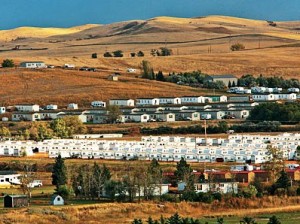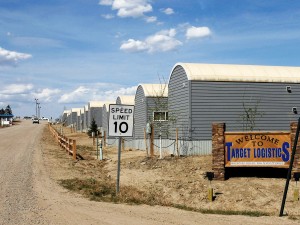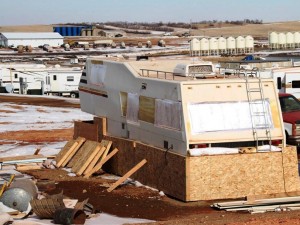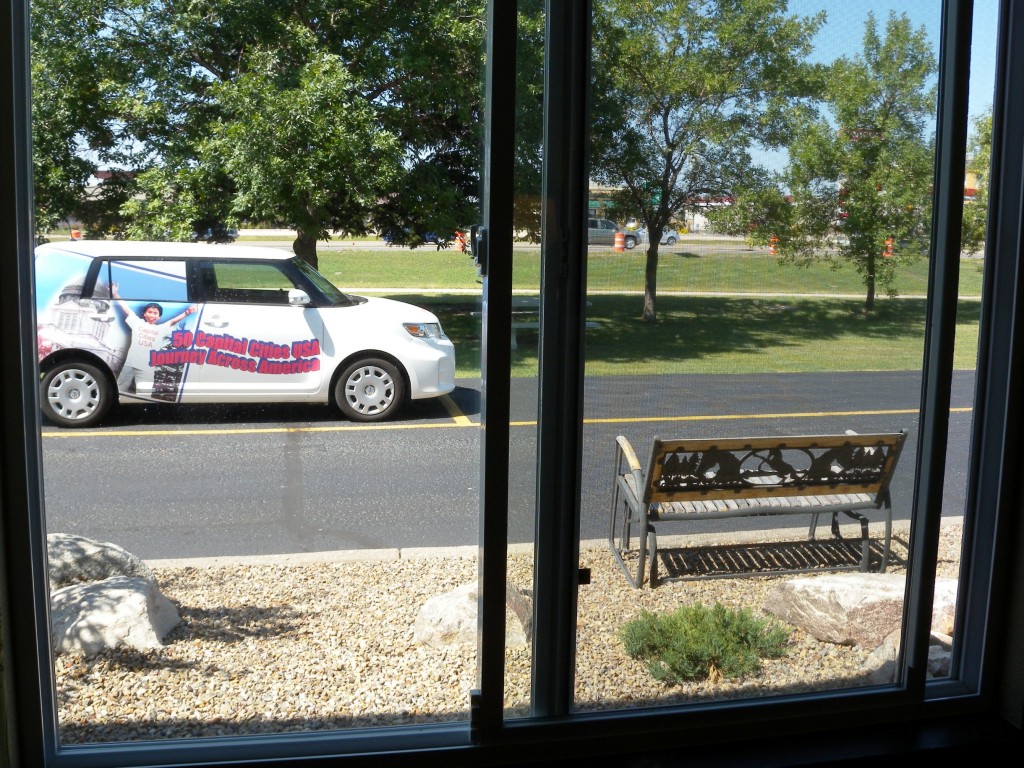» posted on Saturday, August 18th, 2012 by Linda Lou Burton
Sky High
 Linda Burton posting from Bismarck, North Dakota – “Everything’s high in Bismarck,” was the answer I got. “Just wait till you see the price of orange juice when you go to the store.” I’d anticipated summer tourist room rates in Honolulu and Juneau, but Bismarck rates were a surprise. I was too tired last night to look elsewhere; I only removed from the car the items that would get us through the night. My room was sparkling clean and modern, tastefully furnished, overlooking a pretty rock garden and a row of trees between the building and the street. But it was not much bigger than its double bed; there was no work space for my computer; how could I live in such a tight space for two weeks? The manager brought a table and a chair and an extension cord; I thanked him yet began an online search for a bigger place, at a better rate. I found no better deal, but I found the answer to my question “Why so high?” It’s Williston, North Dakota, some 200 miles northwest of here. Williston is called Kuwait on the Prairie now, where 100 new oil wells are drilled every day by some 150 oil companies that have come here since 2006. Sister, there’s an oil boom going on.
Linda Burton posting from Bismarck, North Dakota – “Everything’s high in Bismarck,” was the answer I got. “Just wait till you see the price of orange juice when you go to the store.” I’d anticipated summer tourist room rates in Honolulu and Juneau, but Bismarck rates were a surprise. I was too tired last night to look elsewhere; I only removed from the car the items that would get us through the night. My room was sparkling clean and modern, tastefully furnished, overlooking a pretty rock garden and a row of trees between the building and the street. But it was not much bigger than its double bed; there was no work space for my computer; how could I live in such a tight space for two weeks? The manager brought a table and a chair and an extension cord; I thanked him yet began an online search for a bigger place, at a better rate. I found no better deal, but I found the answer to my question “Why so high?” It’s Williston, North Dakota, some 200 miles northwest of here. Williston is called Kuwait on the Prairie now, where 100 new oil wells are drilled every day by some 150 oil companies that have come here since 2006. Sister, there’s an oil boom going on.
The numbers are staggering. Over 200 drilling rigs are punching holes in the earth; each rig brings about 120 jobs to the state; another 10,000 jobs are created to lay pipe to producing wells and build the structures needed. In a state with only 670,000 people, that’s a huge impact. Some estimates predict that western North Dakota could have as many as 48,000 new wells. This oil-boom comes from a rock formation called the Bakken; it’s about the size of West Virginia and covers a third of North Dakota. The US Geological Survey determined at least 4 billion barrels of recoverable oil; other estimates indicate 20 billion.
 “If you’re unemployed, go to North Dakota” has been the story on the news for several years, framing tales of recession and job loss nationwide. North Dakota isn’t suffering; the state’s unemployment rate is around 3%, in Williston it is less than 1%. The state’s budget has a billion-dollar surplus. Millions of barrels of oil are going out; thousands of people are coming in. That’s called a “boom,” and the oil business affects every other business too. Workers need housing and food; as families follow there is need for stores, and schools, and community services. Water, sewer, garbage, traffic; it all must be managed; more roads, more
“If you’re unemployed, go to North Dakota” has been the story on the news for several years, framing tales of recession and job loss nationwide. North Dakota isn’t suffering; the state’s unemployment rate is around 3%, in Williston it is less than 1%. The state’s budget has a billion-dollar surplus. Millions of barrels of oil are going out; thousands of people are coming in. That’s called a “boom,” and the oil business affects every other business too. Workers need housing and food; as families follow there is need for stores, and schools, and community services. Water, sewer, garbage, traffic; it all must be managed; more roads, more  traffic cops and teachers and retail clerks; the list goes on and on. And prices soar; the balance between “demand” and “supply” is kept. Williston’s McDonald’s is the busiest in the country now; start out bagging fries at $15 an hour. If you have a license, no criminal record, and can drive a truck, you can expect to pull in a six-figure salary. Where else in the country is that happening? And how does a small community weather such a rapid, and dramatic, change?
traffic cops and teachers and retail clerks; the list goes on and on. And prices soar; the balance between “demand” and “supply” is kept. Williston’s McDonald’s is the busiest in the country now; start out bagging fries at $15 an hour. If you have a license, no criminal record, and can drive a truck, you can expect to pull in a six-figure salary. Where else in the country is that happening? And how does a small community weather such a rapid, and dramatic, change?
 This summer, the Wal-Mart in Williston began offering $25,000 cubes for sale; 80 square feet of “temporary housing,” with two bunks, a flat-screen TV, a refrigerator, and a fold-out table inside. Workers need to be housed, and major oil companies are renting entire floors of hotels and apartments in the area. They are also building “man-camps” to meet the need. Man-camps are pretty much what you’d think – a place to sleep, and a place to eat, not much on amenities. Target Logistics has almost 3,000 bedrooms under management, covering hundreds of miles around Williston. Halliburton relocated housing units from the 2010 Vancouver Winter Olympics Village to Williston for its workers. Former New England Patriot Jarvis Green owns a construction company building a 500-person man-camp in Watford City, south of Williston.
This summer, the Wal-Mart in Williston began offering $25,000 cubes for sale; 80 square feet of “temporary housing,” with two bunks, a flat-screen TV, a refrigerator, and a fold-out table inside. Workers need to be housed, and major oil companies are renting entire floors of hotels and apartments in the area. They are also building “man-camps” to meet the need. Man-camps are pretty much what you’d think – a place to sleep, and a place to eat, not much on amenities. Target Logistics has almost 3,000 bedrooms under management, covering hundreds of miles around Williston. Halliburton relocated housing units from the 2010 Vancouver Winter Olympics Village to Williston for its workers. Former New England Patriot Jarvis Green owns a construction company building a 500-person man-camp in Watford City, south of Williston.  Companies are paying an average of $120 per night to house and feed their workers. Apartment suites may rent for $6,700 a month. Williston Mayor Ward Koeser is overwhelmed with growth management problems as developers build hundreds of houses and thousands of apartment units. Despite the building frenzy, there is not enough, and new arrivals may wind up sleeping in their cars or camping, their street address the Wal-Mart Parking Lot.
Companies are paying an average of $120 per night to house and feed their workers. Apartment suites may rent for $6,700 a month. Williston Mayor Ward Koeser is overwhelmed with growth management problems as developers build hundreds of houses and thousands of apartment units. Despite the building frenzy, there is not enough, and new arrivals may wind up sleeping in their cars or camping, their street address the Wal-Mart Parking Lot.
I woke this morning up-to-speed on facts. My tiny room seems spacious to me now. I took my breakfast ticket to the dining room at 8; ordered up some scrambled eggs, hash browns, bacon, toast. The coffee’s hot, the orange juice cold; the cook called out my name. My food is ready; the morning paper’s there for me to read; I’m with the program now. The Scion waited in the parking lot. I’m staying put, and glad I have a place.

